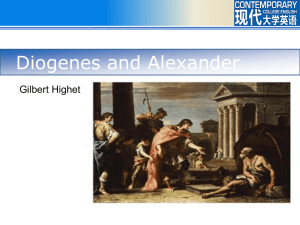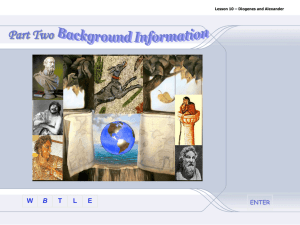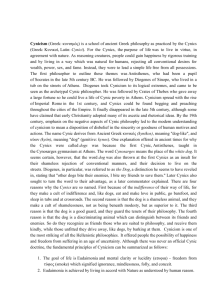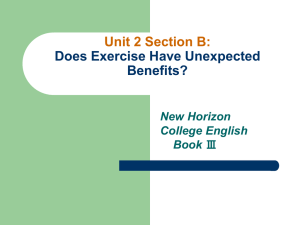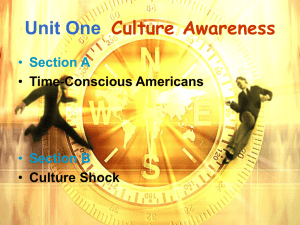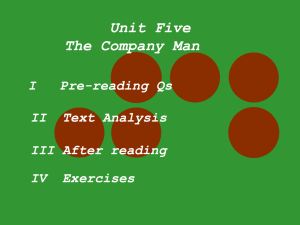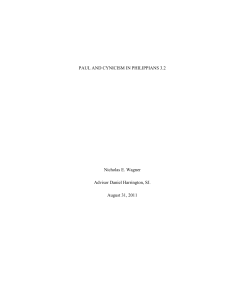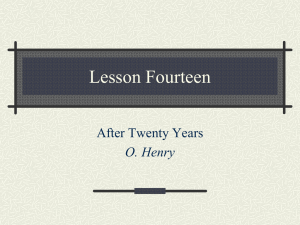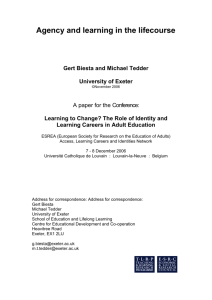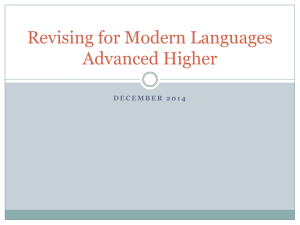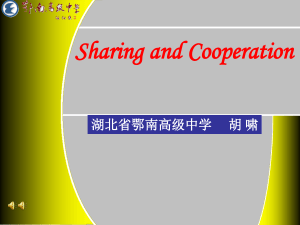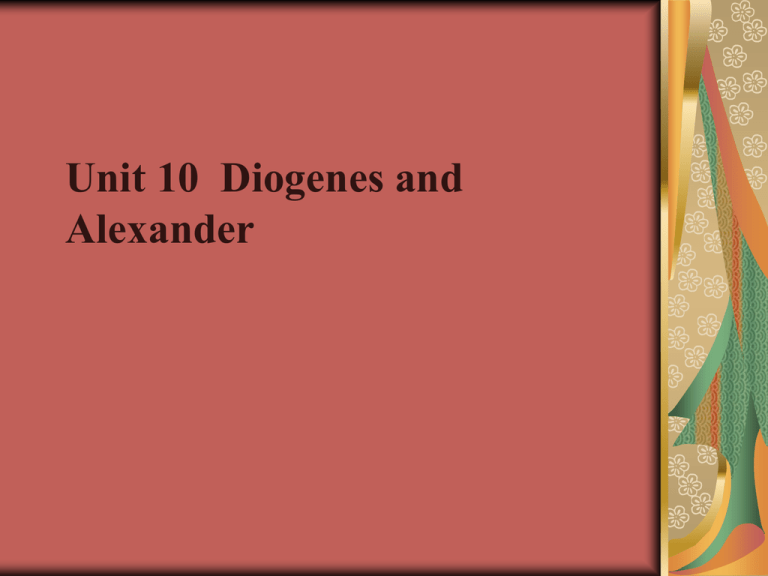
Unit 10 Diogenes and
Alexander
1.If the world were to follow Diogenes,
what would be the results?
2.Does Diogenes remind you of any
ancient Chinese philosopher? Would you
like to make a comparison between them?
Cynic and Cynicism (愤世疾俗者与犬
儒主义) :
The Oxford English Dictionary describes
a cynic as a person “ disposed to find
fault “ and as one who “shows a
disposition to disbelieve in the sincerity
or goodness of human motives and
actions, and is wont to express this by
sneers and sarcasm.” In short ,the cynic is
“a sneering fault-finder”
The ancient school of Cynicism was
founded in the fourth century BC by
Antisthenes. The Cynics urged both men
Diogenes was a famous Cynic philosopher
living during the time of Plato ( the 4th century
BC ). Having to flee from Sinope because of
charges against him and his father for debasing
the public coin , Diogenes went to Athens
where he studied under comforts of civilized
life , and lived an extremely ascetic lifestyle.
Later on the captured by pirates and sold into
slavery in Crete to Xeniades, who was so
impressed by the philosopher that he made him
the teacher of his children . He is said to have
died of old age in the same year as Alexander
the Great in 323 BC.
Part One (para.1-10) Description of Diogenes
as a beggar, a philosopher and a missionary, his
lifestyle and doctrine: Cynicism.
Part Two (para.11-12) Description of
Alexander the Conqueror, who was the greatest
man of the time .
Part Three(para.13-17) The dramatic
encounter of the two , revealing that only these
two men were the real free man in the world .
to scratch each other’s backs : 互相挠背(串通一气做互相有利的不
正当的事情).
to do business with that country : 和那个国家做生意.
publish or perish : 不出版,就完蛋。(西方学界口号).
to found a new religion : 建立一个新的宗教
to convert RMB into foreign currency : 将人民币换成外币
to seek the truth : 寻找真理
to discard the old traditions : 抛掉旧的传统
to satirize human vanity : 讽刺人的虚荣
to inhabit that island : 在那岛上住人
to neglect one’s duty : 玩忽职守
to escape the consequences : 逃避后果
to erase it from one’s memory : 从记忆中消除
to take command : 负责指挥
to block one’s way : 挡路
to ruin one’s reputation : 毁掉名誉
(1) Not only do we want it now ;we don’t even want to be kept
waiting for it .
A phrase of negative form or meaning occurs at the beginning of a
sentence/clause.
(2) Robert never forgot that blessed Christmas. Nither did his father.
An elliptical sentence begins with so,or nor, or neither
(3) Only after much persuasion did Lao Liu agree to be our coach.
A sentence begins with only when followed by an expression of
manner, place ,time, or reason
(4) At the head of the parade marched the guards of honor.
A sentence / clause begins with an adverbial of place or position
Paraphrase
1. ... he looked like a beggar or a lunatic.
lunatic: (offensive slang abbreviation:
loony) an insane or mad or crazy person;
someone who is extremely foolish or
reckless
2. He had ... done his business like a dog
at the roadside, washed at the public
fountain. He had emptied his bowels or
passed water like a dog at the roadside. It
is interesting to observe how euphemisms
work..
is used as a noun suffix, e. g.
a few mouthfuls; a spoonful of honey? a
3. with a few handfuls of water scooped
from the spring.
handful: Remind students that "-ful" here
4. out of his hollowed hands: from his
hands which join together to form a cup or
hollow (empty space)
5. Sometimes they threw bits of food, and
got scant thanks; sometimes a mischievous
pebble, and got a shower of stones and
abuse. (Notice the parallel structure of this
sentence.)
a mischievous pebble: a pebble from a
mischievous person
abuse: rude, angry, and offensive words
骂人的话,谩骂
6. He knew they were mad, each in a
different way. He knew they were mad,
each in a different way. Some were mad
about money; some were mad about
power; some were mad about sex, etc.
7. It was not .. .even a squatter's hut. A
squatter is a person who lives in an empty
building or on a piece of land without
permission and without paying any rent.
A squatter's hut naturally is in a poor
condition.
8. He thought everybody lived far too
elaborately, expensively, anxiously. He
thought that our life is too complicated,
too costly, and gives us too much pressure.
9. the animals live healthy lives.
Diogenes's answer to the human
problems is to go back to nature, and he
does not see why we can't because natural
lives are very healthy lives.
10. garment:
The technical term for any article of
clothing. There are of course special
terms for special kinds of garments or
clothes such as "shirt", "dress", "jacket",
"vest", "skirt" etc. which proves
Diogenes's point when he says life is too
complicated.
Post-reading discussions
1. What was Diogenes’ philosophy?
2. What did Diogenes value most?
3. What kind of life can be called a
simple life?
4. What does “to restamp the currency”
mean?
Pre-reading discussions
Read the text and listen to the recording.
Try to understand as much as possible
with the help of the notes, glossary,
dictionaries and reference books.
2) What kinds of needs do you want to
satisfy yourself?
3) Can you classify them? What are they?
4) If your needs cannot be satisfied, what
will you feel? What will you do?
Background knowledge
A marriage licence (spelled license in
American English)
Text analysis
Part I (Para. 1-2) The author decided to
camp in the Central Park .
Part II (Para. 3-6) The first or two hours
and his feeling
and the fear Central Park inspired
Part Ⅲ (Para. 7-12) Central Park history
and another scare
Part Ⅳ (Para. 13-25) My sleep over in the
wood
Language Focus
Introduction to the text
languge points
1.All five needs are built into our genetic
structure as instructions for how we must
attempt to live our lives. Humans are born with
the five needs/All five needs are inborn as part
of our nature and direct us as we go through our
lives.
build in/into: to cause to be part of sth which
cannot be separated or removed from it; to
make... inherent, e. g.
We don't want to build in too much furniture,
just a bookcase and two wardrobes.
I hope you'll build some entertainment into the
schedule for the training.
2. our biological destiny: what we have to
experience as humans; to go through childhood,
adolescence, adulthood and old age, to produce
offspring and die
3.When we attempt to satisfy the non-essential
psychological needs, such as belonging, fun,
freedom, and especially power, we run into
more difficulty. The higher, or psychological,
needs are not so clear-cut and not so easy to
satisfy.
run into: to begin to experience
(difficulty); get into (a difficult or
unpleasant situation), e. g.
After successive crop failures. Farmer
Jones ran into debt.
4.Even politicians try to appear humble,
emphasizing how much they wish to
serve and how little they want to tell us
what to do. Even politicians try to cover
up their desire for power by saying that
they are running for an office because
they want to do things for their
community and that they really hate to
govern people.
5. They preach the virtues of humility because
the more people they can persuade to be
humble, the more easily they can both preserve
and add to the power that they have.
They advocate humility praising it as an
admirable quality because they know the more
people they make humble, the more easily they
can keep and strengthen the power they have
seized.
add to: to increase, e. g.
The storm added to the difficulty of the sailors.
6. Successful politicians are masters of
this approach and the same expertise is
not unknown in business, higher
education and even religion. Successful
politicians are very skillful in using this
technique of sharing a little power with
the people and this approach is also used
by businessmen, leaders in higher
education and even in religion.
master: a person who is skilled at sth, e.
g. masters of disguise
unknown adj: never happening or
existing
7. If you look around in any society,
you cannot fail to see the all-pervasive
effect of this need. You can find
without fail that this need for power is
affecting all sections of any society.
(In the rest of paragraph, the writer
goes on to show this pervasiveness of
the human need for power.
Post-reading discussions
1. What do you think of William
Glasser’s classification of needs?
2. To you, which one is the most
important?
3. If you have to abandon one or two of
them, which will you choose?

